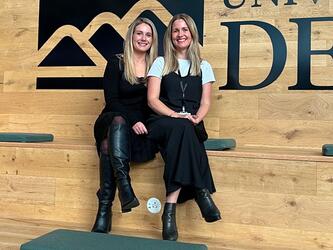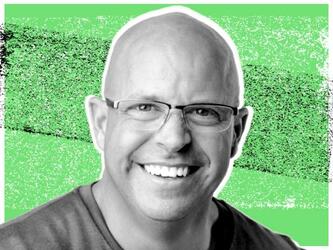Taking a different view
What made you set up ClearView Research in the first place?
I’ve always been curious about what people think, and want to understand why people do what they do. From an early age, I’ve also been passionate about and interested in how we can inform leaders’ decision-making, so they can make better decisions. So research was the perfect profession for me.
We set up ClearView Research (CVR) for three main reasons. The first was that, to my surprise, when I first started conducting research projects from the age of 18 (I am now 25 ), I realised a lot of people and businesses in the industry were not capturing the thoughts, attitudes and behaviours of those most marginalised in society. People were going for the ‘easy’ targets and not going the extra mile to hear the voices and opinions of those generally excluded from mainstream research. People were talking about millennials, children and people from under-represented groups but not actually truly engaging and collaborating with them, in their studies. We wanted to do things differently.
The second was that I came across a lot of interesting research studies that were full of rich data and so much insight, but they were difficult and boring – in terms of their content or presentation style. Research can look beautiful, digestible and you shouldn’t need a PhD to understand it. As a business, we pride ourselves on ensuring that our research is always accessible, engaging and inclusive for a wide audience.
Finally, I saw poor decision-making from leaders in politics, business and charities. These are the people we rely on and trust to make decisions on our behalf and in our best interest. Yet, they often act without correct and up-to-date information. Some act on their gut instinct or, worse, no consultation at all. I am a big believer that research can be an effective tool for sound decision-making and, most importantly, social change.
Research can change the hearts and minds of decision-makers across all fields and industries. We need to ensure that they are given trusted, well-researched and valuable insights to help them to have a clear view, so they can make the best possible decisions.
Were you specifically looking to fill a gap in the market?
I don’t believe in reinventing the wheel. If I’d seen someone else doing what we were doing, then CVR wouldn’t need to exist. We wanted to provide our clients with trusted, unconventional and valuable insights, mainly on millennials, Gen Z and people from under-represented groups. We wanted to help businesses, NGOs and governments to solve complex problems.
What do you offer that’s unique?
CVR has an organic and trusted network of partners of individuals and organisations across various communities in the UK. We’ve built these through personal networks, direct outreach and collaborating with individuals and organisations on the specific brief. We’ve been fortunate to have a database of potential participants and partners that we can call on, and that I’ve been building since I was 18.
We’ve also developed an insight-gathering methodology called ‘solution labs’ which takes a core element of traditional focus group methodology. However, what makes it different is that we take an unconventional approach to gather insight in a co-creative and engaging way. These solution labs appeal to multi-sector clients who are interested in obtaining insights through inclusive and collaborative means.
We don’t just focus on doing research – we take very seriously our approach to effective engagement with all our research participants. We know that being able to engage those least likely to be involved in research studies is key to our USP as a business.
How have your background and experiences helped you with the work you’re doing today?
I really believe my background and experiences have been an asset to my work as a researcher. Growing up in the area I did (Peckham – way before it was this ‘cool’ place to go), I have been exposed to the challenges and difficulties of what life can be like for those who are most excluded from society.
Being a young person, being black, being part of a minority group, coming from a deprived area and so on, means that I have a unique understanding of what life is like for those who we tend to work with for our own studies and reports. This understanding has helped shape our participant engagement approach and the way we do our work too.
What methods of research do you think work best in reaching younger audiences?
Nothing beats face-to-face engagement when wanting to reach people in my generation. If you want to hear from those who are least likely to engage in research it is best to meet them in person. We mainly run solution labs with younger audiences. The people we engage through our solution labs become valuable social referrers for our online surveys.
What are the most interesting projects you’ve worked on in the past year?
We were commissioned by GambleAware last year to conduct a study into the attitudes of black, Asian and minority ethnic people towards gambling. This research involves us carrying out solution labs and in-depth interviews with people aged 11-24 across the UK.
We were also commissioned by Unicef UK to gather in-depth insights from children and young people living in the UK aged between 10 and 20 about their habits and behaviour online and offline; their behaviour around sharing content; their views on children’s rights; and their understanding of Unicef UK.
The insights will assist the youth strategy team to develop more productive ways for children and young people to contribute to Unicef UK’s organisational priorities. The team wanted to obtain these insights in an engaging manner that would best capture the views of children and young people. We conducted solution labs with children and young people across Swansea, London and Birmingham and we got more than 800 responses to our online survey. We’ve presented the insights, and the recommendations are currently being implemented.
We worked in collaboration with another charity called Peer Power on a brief for NHS England. This research was to provide a youth voice to the review process of the healthcare standards of young people in secure settings. It involved us conducting solution labs and interviews with young people in different secure settings – such as youth offender institutes, secure training centres and secure children’s homes.
We shared our insights in a report and a presentation to the expert reference group responsible for reviewing the standards.
You do a lot with younger audiences – what do you think are the biggest factors affecting millennials today?
The top three, in no particular order, are employment, housing, and mental health and wellbeing.
So many organisations are trying to improve their diversity and inclusion; what is the most important change businesses can make to be more inclusive?
Reverse mentoring programmes are very effective. Reverse mentoring relationships provide a safe place to get comfortable talking about race and inclusion in the workplace, which leads to fresh perspectives and accountability on specific actions.
These relationships can be more challenging, but also powerful, as they are often contrary to the usual hierarchy. And senior sponsorship of reverse mentoring programmes has become more popular across sectors to embrace diversity. It’s contributed to building more inclusive senior leaders and empowered young future leaders to affect change.
There are several businesses and organisations already doing this, and a great example can be seen at KPMG in the UK. There, graduate Olu Odubajo, a customer and digital analyst, is mentoring managing partner Philip Davidson.
He and other junior colleagues from black heritage are mentoring senior leaders in the firm. KPMG isn’t perfect, but it’s making strides in the
right direction. More businesses and organisations need to make more of an effort to recruit staff from under-represented groups and to stop making excuses.
Diverse talent exists. If you say that you cannot find people from under-represented groups to take up positions, particularly in leadership or governance roles, you are either not looking hard enough or looking in the wrong places.
What are your ambitions for ClearView? Do you want to expand into regions/disciplines/markets that you aren’t in currently?
We would love to expand our business into multiple African markets. Over the past year, I have been to six countries in Africa and seen the enormous opportunity for our work to thrive there. As someone from the African diaspora, I would love to replicate the impact we are having in the UK in the motherland too.
We would also want to do more work in helping organisations – big and small – to recruit millennials for governance roles, particularly for charities, where we know that trustees aged 18-24 represent just 0.5% of all charity trusteeships.
We would love to play a role in making an impact .

We hope you enjoyed this article.
Research Live is published by MRS.
The Market Research Society (MRS) exists to promote and protect the research sector, showcasing how research delivers impact for businesses and government.
Members of MRS enjoy many benefits including tailoured policy guidance, discounts on training and conferences, and access to member-only content.
For example, there's an archive of winning case studies from over a decade of MRS Awards.
Find out more about the benefits of joining MRS here.














0 Comments